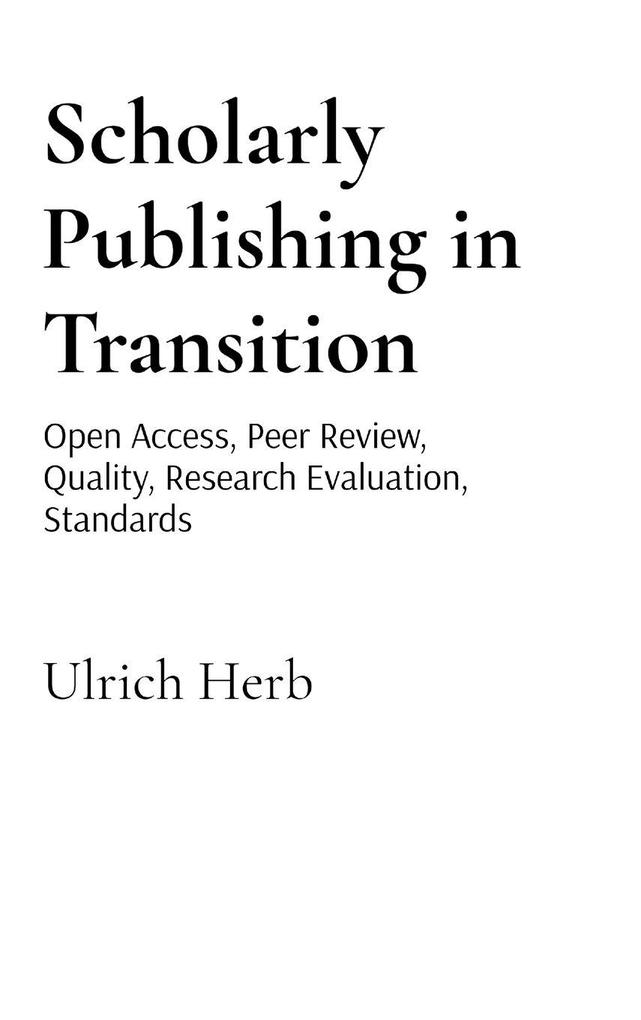Bücher versandkostenfrei*100 Tage RückgaberechtAbholung in der Wunschfiliale
Ihr Gutschein zum Schulstart: 15% Rabatt11 auf Kalender & Schreibwaren mit dem Code DATUM15
Jetzt einlösen
mehr erfahren
Zustellung: Fr, 19.09. - Di, 23.09.
Versand in 7 Tagen
VersandkostenfreiBestellen & in Filiale abholen:
Academic visibility and recognition have become more crucial than ever for career advancement and funding opportunities. But how can researchers publish successfully, responsibly, and strategically in the digital age?
Ulrich Herb-sociologist, information scientist, publishing consultant, open science expert, and long-time lecturer-takes you on a vivid journey through the world of scholarly publishing and research evaluation. Since 2001, he has advised researchers, academics, and institutions. His extensive experience from countless workshops and consulting projects, paired with a keen eye for trends and pitfalls, makes his insights especially valuable.
In this practical guide, he explores current publishing models, explains how peer review, open science, impact metrics, and Creative Commons work, warns about predatory publishing, and offers concrete tips on how to maximize the visibility of your research output.
Packed with case studies, methodological recommendations, digital tools, and a critical perspective on reform movements in academia, this book is an essential companion for anyone looking to shape their academic career with confidence and insight.
Whether you're just starting out or already an experienced researcher-benefit from Ulrich Herb's expertise, hands-on knowledge, and clear-eyed view of the opportunities and challenges of scholarly publishing in the 21st century.
Dr. Ulrich Herb is a sociologist and information scientist specializing in scholarly communication and Open Access. He works as an independent consultant, advising researchers, academic institutions, and policy makers on strategies for Open Science and scientific publishing. Herb has conducted in-depth analyses of major initiatives such as Plan S and has contributed expert reports on various multinational scholarly projects. Widely acknowledged as an authority in the field, he combines practical experience with academic research to advance open and transparent scholarly communication. Dr. Herb is committed to promoting Open Access and Open Science at both national and international levels, regularly leading workshops, publishing critical articles, and supporting infrastructure development for the academic community.
Ulrich Herb-sociologist, information scientist, publishing consultant, open science expert, and long-time lecturer-takes you on a vivid journey through the world of scholarly publishing and research evaluation. Since 2001, he has advised researchers, academics, and institutions. His extensive experience from countless workshops and consulting projects, paired with a keen eye for trends and pitfalls, makes his insights especially valuable.
In this practical guide, he explores current publishing models, explains how peer review, open science, impact metrics, and Creative Commons work, warns about predatory publishing, and offers concrete tips on how to maximize the visibility of your research output.
Packed with case studies, methodological recommendations, digital tools, and a critical perspective on reform movements in academia, this book is an essential companion for anyone looking to shape their academic career with confidence and insight.
Whether you're just starting out or already an experienced researcher-benefit from Ulrich Herb's expertise, hands-on knowledge, and clear-eyed view of the opportunities and challenges of scholarly publishing in the 21st century.
Dr. Ulrich Herb is a sociologist and information scientist specializing in scholarly communication and Open Access. He works as an independent consultant, advising researchers, academic institutions, and policy makers on strategies for Open Science and scientific publishing. Herb has conducted in-depth analyses of major initiatives such as Plan S and has contributed expert reports on various multinational scholarly projects. Widely acknowledged as an authority in the field, he combines practical experience with academic research to advance open and transparent scholarly communication. Dr. Herb is committed to promoting Open Access and Open Science at both national and international levels, regularly leading workshops, publishing critical articles, and supporting infrastructure development for the academic community.
Produktdetails
Erscheinungsdatum
01. September 2025
Sprache
englisch
Seitenanzahl
80
Autor/Autorin
Ulrich Herb
Verlag/Hersteller
Produktart
gebunden
Gewicht
280 g
Größe (L/B/H)
235/157/9 mm
ISBN
9783982776415
Entdecken Sie mehr
Bewertungen
0 Bewertungen
Es wurden noch keine Bewertungen abgegeben. Schreiben Sie die erste Bewertung zu "Scholarly Publishing in Transition" und helfen Sie damit anderen bei der Kaufentscheidung.









